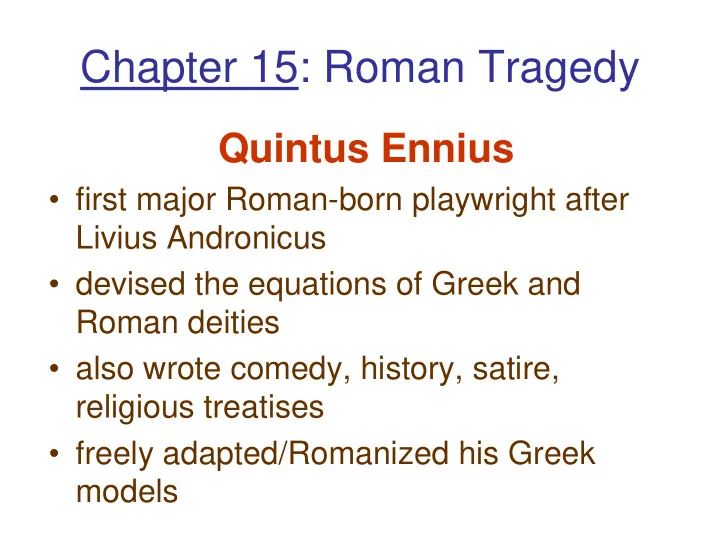

Chapter 15: Roman Tragedy Quintus Ennius • first major Roman-born playwright after Livius Andronicus • devised the equations of Greek and Roman deities • also wrote comedy, history, satire, religious treatises • freely adapted/Romanized his Greek models
Chapter 15: Roman Tragedy fabulae praetextae • plays based on Roman life – literally, “toga-wearing plays” • first known author is Gnaeus Naevius – who is also known to have gotten into trouble for irritating important politicians • only one surviving example of these plays: Seneca’s Octavia (after 68 BCE )
Chapter 15: Roman Tragedy Marcus Pacuvius • tragedian (ca. 220-130 BCE ) • used contaminatio – e.g. merged Sophocles and Euripides • said to have been grave in tone – but Nerei repandirostrum incurvicervicum genus (“Nereus’ bent-beaked, convex-necked brood,” i.e. dolphins)?
Chapter 15: Roman Tragedy Lucius Accius • tragedian (ca. 170-86 BCE ) • considered Rome’s best tragic poet – his work was available for reading at least 500 years after his lifetime • like his predecessors, engaged in contaminatio • and wrote fabulae praetextae
Chapter 15: Roman Tragedy Age of Popular Entertainment • horse races, gladiatorial combat, public executions of criminals – “ bread and circuses ” (Pliny the Younger) • but not all entertainments were low-brow – closet dramas, cf. Ovid’s Medea • also, pantomime (soloist + chorus) – stories told through dance and expressive gesture
Chapter 15: Roman Tragedy Horace’s Ars Poetica • poetic instruction manual for how to write a drama – cf. Aristotle’s Poetics – n.b. neither Aristotle nor Horace are known to have written a play
Chapter 15: Roman Tragedy Horace’s Ars Poetica • Ars Poetica codifies the “rules” for drama – e.g. begin your story by leaping in medias res (“into the middle of things”) – through Horace these rules were passed to early modern dramatists • especially classical French playwrights like Racine and Molière • in particular, the five-act rule
Chapter 15: Roman Tragedy Seneca • only surviving Roman tragedies • these dramas may not be by the famous Roman philosopher and tutor of Nero – Octavia cannot be by Seneca • he is a character in the play • hints at Nero’s death (three years after Seneca’s) – the plays do not espouse Stoic principles • characters are brutal and unsympathetic • cf. Atreus in Thyestes
Chapter 15: Roman Tragedy Seneca • performability : were these tragedies even designed for performance? – can they even be performed the way they’re written? • full of sententiae (“opinions,” pithy axioms for living) – do they conform with the type of performance spaces attested for the day? • yes! both physically and emotionally!
Chapter 15: Roman Tragedy Seneca selections from Seneca’s Phaedra
Recommend
More recommend